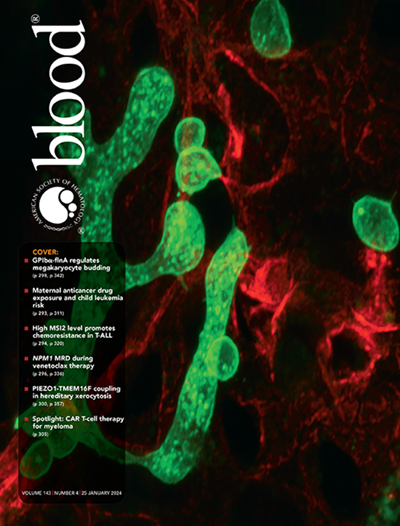Genotype-specific immune responses at the intestinal barrier predispose to colitis in chronic granulomatous disease in mice.
IF 21
1区 医学
Q1 HEMATOLOGY
引用次数: 0
Abstract
Chronic granulomatous disease (CGD) is an inborn error of immunity caused by defects in any one of the 6 subunits (gp91phox, p47phox, p22phox, p67phox, p40phox or chaperone EROS) forming the nicotinamide adenine dinucleotide phosphate (NADPH) oxidase complex 2 (NOX2) and resulting in defective phagocyte-derived reactive oxygen species (ROS) production. Almost 50% of patients with CGD have inflammatory bowel disease (IBD) associated with dysbiosis and age of IBD onset may vary according to CGD genotype. While we previously demonstrated that the intestinal microbiota determines colitis susceptibility in CGD mice, underlying mechanisms remain unknown. We hypothesized that NOX2 defects are associated with distinct intestinal microbiome signatures and immune responses, which impact colitis severity. Chemical colitis susceptibility was evaluated in 2 strains of CGD mice (gp91phox-/- and p47phox-/-) with distinct microbiota, from 2 different animal facilities, while also evaluating the impact of microbiota standardization and colitogenic microbiota transfer on mucosal immune responses at the intestinal barrier. While p47phox-/- and gp91phox-/-mice harbouring colitogenic microbiota had increased colitis severity, the intestinal epithelial cells from p47phox-/- mice produced more ROS which was associated with increased NOX isoform gene expression. In contrast, gp91phox-/- mice had decreased mucin production and a mucosal immune response profile suggestive of increased inflammasome activation at the intestinal barrier compared to control and p47phox-/- mice. Our findings suggest that the microbiota impacts colitis susceptibility in a CGD genotype-specific manner, thereby potentially explaining differences in the timing of IBD onset in patients with different CGD genotypes while identifying potential novel and personalized therapeutic targets.小鼠慢性肉芽肿疾病中肠道屏障的基因型特异性免疫反应易导致结肠炎。
慢性肉芽肿病(CGD)是一种先天性免疫错误,由形成烟酰胺腺嘌呤二核苷酸磷酸(NADPH)氧化酶复合物2 (NOX2)的6个亚基(gp91phox、p47phox、p22phox、p67phox、p40phox或伴侣EROS)中的任何一个缺陷引起,并导致吞噬细胞衍生的活性氧(ROS)产生缺陷。几乎50%的CGD患者患有与生态失调相关的炎症性肠病(IBD), IBD发病年龄可能因CGD基因型而异。虽然我们之前证明了肠道微生物群决定了CGD小鼠结肠炎的易感性,但潜在的机制仍然未知。我们假设NOX2缺陷与不同的肠道微生物组特征和免疫反应相关,从而影响结肠炎的严重程度。本研究对来自2个不同动物设施的2株具有不同菌群的CGD小鼠(gp91phox-/-和p47phox-/-)进行了化学结肠炎敏感性评估,同时评估了菌群标准化和结肠炎菌群转移对肠屏障粘膜免疫反应的影响。虽然p47phox-/-和gp91phox-/-携带结肠炎微生物群的小鼠结肠炎严重程度增加,但p47phox-/-小鼠的肠上皮细胞产生更多ROS,这与NOX异构体基因表达增加有关。相比之下,与对照组和p47phox-/-小鼠相比,gp91phox-/-小鼠的黏液蛋白产生减少,粘膜免疫反应谱表明肠道屏障炎性体激活增加。我们的研究结果表明,微生物群以CGD基因型特异性的方式影响结肠炎易感性,从而可能解释不同CGD基因型患者IBD发病时间的差异,同时确定潜在的新型和个性化治疗靶点。
本文章由计算机程序翻译,如有差异,请以英文原文为准。
求助全文
约1分钟内获得全文
求助全文
来源期刊

Blood
医学-血液学
CiteScore
23.60
自引率
3.90%
发文量
955
审稿时长
1 months
期刊介绍:
Blood, the official journal of the American Society of Hematology, published online and in print, provides an international forum for the publication of original articles describing basic laboratory, translational, and clinical investigations in hematology. Primary research articles will be published under the following scientific categories: Clinical Trials and Observations; Gene Therapy; Hematopoiesis and Stem Cells; Immunobiology and Immunotherapy scope; Myeloid Neoplasia; Lymphoid Neoplasia; Phagocytes, Granulocytes and Myelopoiesis; Platelets and Thrombopoiesis; Red Cells, Iron and Erythropoiesis; Thrombosis and Hemostasis; Transfusion Medicine; Transplantation; and Vascular Biology. Papers can be listed under more than one category as appropriate.
 求助内容:
求助内容: 应助结果提醒方式:
应助结果提醒方式:


